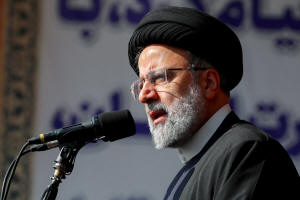Iran president blames foreign enemies for wave of schoolgirl poisonings
 Send a link to a friend
Send a link to a friend
 [March 03, 2023]
(Reuters) - Iranian President Ebrahim Raisi on Friday
blamed a wave of poisonings of hundreds of schoolgirls around the
country on Tehran's enemies. [March 03, 2023]
(Reuters) - Iranian President Ebrahim Raisi on Friday
blamed a wave of poisonings of hundreds of schoolgirls around the
country on Tehran's enemies.
The so-far unexplained poison attacks at more than 30 schools in at
least four cities started in November in Iran's Shi'ite Muslim holy city
of Qom, prompting some parents to take their children out of school.
Iran's health minister said on Tuesday that hundreds of girls in
different schools have suffered and some politicians have suggested they
could have been targeted by religious groups opposed to girls'
education.
Raisi, speaking to a crowd in southern Iran on Friday in a speech
carried live on state television, blamed the poisoning on Iran's
enemies.
"This is a security project to cause chaos in the country whereby the
enemy seeks to instill fear and insecurity among parents and students,"
he said.
He did not say who those enemies were although Iranian leaders
habitually accuse the United States and Israel, among others, of acting
against it.
Separately, a senior Iranian official said a fuel tanker found next to a
school in a Tehran suburb and which had also been spotted in two other
cities was probably involved in the poisonings.

Authorities seized the tanker and arrested its driver, Reza Karimi Saleh,
deputy governor of Pardis suburb, told the semi-official Tasnim news
agency.
He is the first government official to report an arrest in connection
with the wave of poisonings.
He said the same tanker had also been to Qom and Boroujerd, in Lorestan
Province in western Iran, where students have also suffered from
poisoning. He did not elaborate.
"Guards at a parking lot where the fuel tanker was parked also suffered
from poisoning," Saleh said, referring to the Pardis site.
[to top of second column]
|

Iranian President Ebrahim Raisi speaks
during the 44th anniversary of the Islamic Revolution in Tehran,
Iran, February 11, 2023. President Website/WANA (West Asia News
Agency)/Handout via REUTERS

In Geneva, the United Nations human rights office on Friday called
for a transparent investigation into the attacks.
"We're very concerned about these allegations that girls are being
deliberately targeted under what appear to be mysterious
circumstances," Ravina Shamdasani, spokesperson for the U.N. High
Commissioner for Human Rights, told a briefing.
She said the findings of a government investigation should be made
public and the perpetrators brought to justice.
Some Iranian politicians have suggested the schoolgirls could have
been targeted by religious groups opposed to girls' education.
Social media posts are replete with photos and videos of
hospitalized girls. Some said they were nauseaous and suffered heart
palpitations. Others complained of headaches or heart palpitations.
Reuters could not verify the posts.
Schoolgirls have also taken part in the anti-government protests
triggered by the death in custody of an Iranian-Kurdish woman last
September. They have removed their mandatory hijabs in classrooms,
torn up pictures of Supreme Leader Ayatollah Ali Khamenei and called
for his death.
In one online video last year, schoolgirls are seen waving their
heascarves in the air and heckling a member of Iran's paramilitary
Basij force.
(Reporting by Dubai newsroom, Gabrielle Tétrault-Farber in Geneva;
Editing by; Angus MacSwan)
[© 2023 Thomson Reuters. All rights
reserved.]This material may not be published,
broadcast, rewritten or redistributed.
Thompson Reuters is solely responsible for this content. |